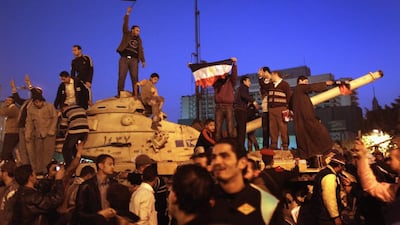On February 19, 2011, barely one week after Hosni Mubarak was forced out as president of Egypt, five exiled Libyan opposition leaders are apparently kidnapped, one by one. Two weeks later, a mid-level US diplomat is murdered while dining with his wife in a Budapest restaurant.
Uncovering the connections between these disparate geopolitical events is the main plot line underpinning the unusual new thriller, The Cairo Affair, by the best-selling author Olen Steinhauer.
Clearly, this is the work of a pro. Not only is it a page-turner with constant twists and turns, it is also a well-written piece of literature, a cut above its genre. The characters are complex human beings far from the James Bond image.
The naive assumptions and uncertainty of the early days of the Arab Spring, lurking in the background, add extra depth. Before the Egyptian revolution, one CIA contractor laments, the experienced spies who tailed him were easier to predict than the new radicals, “awkward, fumbling rookies who knew the neighbourhood but wouldn’t know tradecraft if it slapped him in the face”. But surprisingly, this book stumbles at its own speciality. The story relies too heavily on motivations and obtuseness that are simply unbelievable, especially for career agents.
In the Libya-related plot line, a young Libyan-American CIA analyst named Jibril Aziz, convinced that the US is trying to manipulate the simmering opposition to Muammar Qaddafi, heads to the Middle East to find the missing activists. Meanwhile, just before he is killed, Emmett Kohl, the deputy US consul in Hungary, had accused his beautiful wife, Sophie, of having an affair with a CIA official who had worked with Emmett at the embassy in Cairo the prior year. Panicked, Sophie sneaks back into Egypt to try to find her husband’s murderer and cover up her own misdeeds. Those misdeeds are presumably related to a shameful episode during the Kohls’ honeymoon in Prague 20 years earlier, when they jauntily took a side trip to Serbia to “look at a war”.
Steinhauer – who has written eight previous novels and been a finalist for numerous awards – effectively uses literary techniques to subtly scatter his clues. His understated style is perfect for a thriller, where it’s important to have just the right number of hints, hidden with just the right amount of subtlety.
At the Budapest restaurant, for instance, Emmett asks Sophie if anyone knew about her extramarital affair. She thinks: “He was being petty now, as if it truly mattered whether or not someone knew of his bruised pride. But she could give him that. ‘No one,’ she lied. He nodded, but didn’t look relieved.”
Without saying so outright, Steinhauer has signalled that Sophie still cares enough about Emmett to spare his feelings, that her white lie won’t be enough for an immediate reconciliation and that her guilt hasn’t wiped out her ability to see his faults. At the same time, the author, like a magician, has waved a brightly coloured silk handkerchief that distracts from the real drama going on.
Similarly, Steinhauer needs only a few key phrases – “a scratched BMW” or a man’s “cheeks bristling with white hair” – to return repeatedly to the same scenes from different points of view, thus unrolling a complicated, multifaceted view of the story.
The spies and their colleagues have families, headaches and heart attacks, in addition to the mandatory cynicism. The CIA contractor, John Calhoun, is a no-nonsense black former Army sniper who also loves the poetry of T S Eliot, Wallace Stevens and William Carlos Williams. A dedicated Egyptian security official and his frumpy wife become second parents to Aziz, the Libyan-American CIA analyst.
But perhaps the characters are too well-drawn as people and not well enough conceived as spies.
Surely a seasoned security guard like Calhoun would be suspicious when the wife of an Egyptian opposition leader, who already speaks perfectly passable English, insists on meeting only Calhoun and no one else for extra language tutoring because, supposedly, she wants to be taught by an African-American. Yet he takes the job. Nearly every character seems to accept Aziz’s complicated scenario regarding the kidnappings without suggesting a much more obvious explanation.
Most crucially, the motivation behind a key element of the plot – why someone would pass secret files from the US embassy in Cairo to an Egyptian agent – is just too weak.
Despite these flaws, The Cairo Affair is an engrossing and well-written yarn with interesting insights into the current turmoil in the Middle East and the US role. Plus, the reader can feel smarter than the spies.
Fran Hawthorne is an award-winning US-based author and journalist who specialises in covering the intersection of business, finance and social policy.

